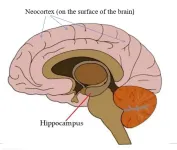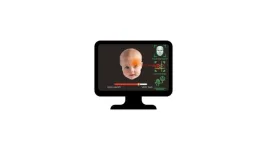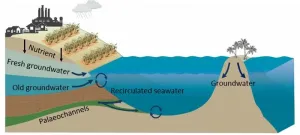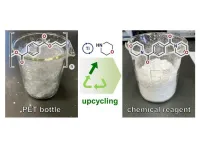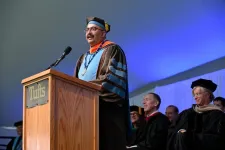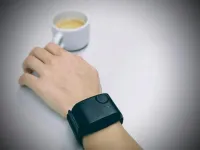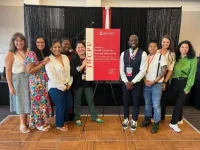(Press-News.org) A new study found that an alternative model to identify patients with lung cancer eligible for screening was more accurate than the currently used method based on the United States Preventive Services Task Force (USPSTF) criteria. The results are published by Wiley online in CANCER, a peer-reviewed journal of the American Cancer Society.
Lung cancer is the leading cause of cancer deaths, and using low-dose computed tomography scans to screen people who are at elevated risk for lung cancer reduces lung cancer deaths. The USPSTF criteria use age and smoking history to determine eligibility for lung cancer screening: individuals aged 50–80 years who currently smoke or used to smoke and quit 15 years ago or less with 20 pack years of smoking history (such as 1 pack a day for 20 years or 2 packs a day for 10 years) are eligible. A more personalized model is the PLCOm2012 lung cancer risk-prediction model based on the Prostate, Lung, Colorectal, and Ovarian Cancer Screening Trial. This model uses additional parameters including personal history of cancer, family history of lung cancer, personal history of chronic obstructive pulmonary disease, education level, body mass index, and race to predict an individual’s risk of lung cancer. (A modified version that does not include race is called PLCOm2012noRace.)
To compare the USPSTF and PLCOm2012 and PLCOm2012noRace methods, Martin Carl Tammemägi, PhD, of Brock University and his colleagues applied them to 1,565 individuals with lung cancer in South Dakota. The PLCOm2012 models had higher sensitivity and identified more people with lung cancer eligible for screening than USPSTF 2013 and USPSTF 2021 criteria. There did not appear to be an eligibility disparity between individuals who self-reported as Indigenous and those who did not, for both the USPSTF criteria and the PLCOm2012noRace model.
The research also indicated that screening people younger than 50 years of age is not warranted, since there were few people who were diagnosed with lung cancer under that age.
“Determining screening eligibility using risk prediction models that consider more individualized lung cancer risk factors has been shown in several studies, including this one, to do a better job in selecting people for screening as compared with USPSTF age and smoking history criteria,” said Dr. Tammemägi. “This research along with similar studies in other underserved populations should be used to encourage policy makers to include the use of more individualized screening eligibility criteria using risk prediction models. Although race is a social construct, until the risk factors for this construct are identified and included in risk prediction models, jurisdictions with large populations of underserved ‘races’ who are found to be at excess risk—including many Indigenous populations—should consider using risk prediction models incorporating race as a predictor variable.”
Additional information
NOTE: The information contained in this release is protected by copyright. Please include journal attribution in all coverage. A free abstract of this article will be available via the CANCER Newsroom upon online publication. For more information or to obtain a PDF of any study, please contact: Sara Henning-Stout, newsroom@wiley.com
Full Citation:
“Sensitivity of US Preventive Services Task Force and PLCOm2012 lung cancer screening eligibility criteria in individuals with lung cancer in South Dakota self‐reporting as Indigenous and non‐Indigenous.” Martin Carl Tammemägi, Kristin Cina, Andrea K. Borondy Kitts, David Koop, Mark A. Petereit, Michele Sargent, and Daniel G. Petereit. CANCER; Published Online: October 9, 2023 (DOI: 10.1002/cncr.34947).
URL Upon Publication: http://doi.wiley.com/10.1002/cncr.34947
Author Contact: Cathy Majtenyi, Research Communications/Media Relations Specialist at Brock University, at cmajtenyi@brocku.ca or +1 905-688-5550
About the Journal
CANCER is a peer-reviewed publication of the American Cancer Society integrating scientific information from worldwide sources for all oncologic specialties. The objective of CANCER is to provide an interdisciplinary forum for the exchange of information among oncologic disciplines concerned with the etiology, course, and treatment of human cancer. CANCER is published on behalf of the American Cancer Society by Wiley and can be accessed online. Follow CANCER on Twitter @JournalCancer and Instagram @ACSJournalCancer, and stay up to date with the American Cancer Society Journals on LinkedIn.
About Wiley
Wiley is a knowledge company and a global leader in research, publishing, and knowledge solutions. Dedicated to the creation and application of knowledge, Wiley serves the world’s researchers, learners, innovators, and leaders, helping them achieve their goals and solve the world's most important challenges. For more than two centuries, Wiley has been delivering on its timeless mission to unlock human potential. Visit us at Wiley.com. Follow us on Facebook, Twitter, LinkedIn and Instagram.
END
Should a more individualized model replace the current method for determining which people should be screened for lung cancer?
The alternative model had greater sensitivity for identifying South Dakota Indigenous and non-Indigenous individuals who had lung cancer
2023-10-09
ELSE PRESS RELEASES FROM THIS DATE:
Is this how antidepressants work, and why they take weeks to kick-in?
2023-10-09
Type of work: peer-reviewed/randomised controlled trial/people
SSRI antidepressants normally take a few weeks before any showing mental health benefits, but how come it takes so long? Now a study from a group of clinicians and scientists provides the first human evidence that this is due to physical changes in the brain leading to greater brain plasticity developing over the first few weeks of SSRI intake. This may also begin to explain one of the mechanisms of how antidepressants work.
This work is presented at the ECNP conference in Barcelona on 9th October. This ...
Teaching expectant mothers to bond with their babies
2023-10-09
Type of work: Peer-reviewed / experimental study / people
Up to a third of mothers don’t bond well with their babies after birth, causing intense emotional distress to both mother and baby1. Now researchers have found that they can train at-risk expectant mothers to recognise and regulate emotions better, potentially reducing their risk of postpartum depression.
Presenting the work at the ECNP Congress in Barcelona, researcher Dr Anne Bjertrup said:
People generally have an automatic tendency to see the positive or negative in any situation. In previous studies we saw that certain ...
Young children who are close to their parents are more likely to grow up kind, helpful and ‘prosocial’
2023-10-09
A loving bond between parents and their children early in life significantly increases the child’s tendency to be ‘prosocial’, and act with kindness and empathy towards others, research indicates.
The University of Cambridge study used data from more than 10,000 people born between 2000 and 2002 to understand the long-term interplay between our early relationships with our parents, prosociality and mental health. It is one of the first studies to look at how these characteristics interact over a long period spanning childhood and adolescence.
The researchers ...
The hidden scars: Stigmatization a major impact of skin diseases across Europe
2023-10-09
(Lugano, Monday, 9 October 2023) A major pan-European study has revealed that almost all patients affected by skin diseases face embarrassment, with the psychological burden compounding the physical impact of living with the disease.1,2
The Burden of Skin Disease in Europe, published today in the Journal of the European Academy of Dermatology and Venereology (JEADV), analysed 19,015 individuals with a range of skin diseases and revealed the huge psychological toll of living with a disease. The diseases examined included, amongst others, fungal skin infections, acne, atopic dermatitis (eczema), alopecia, psoriasis and sexually transmitted diseases (STDs).
With high levels of stigmatisation, ...
Discovery of invisible nutrient discharge on Great Barrier Reef raises concerns
2023-10-08
Scientists using natural tracers off Queensland’s coast have discovered the source of previously unquantified nitrogen and phosphorous having a profound environmental impact on the Great Barrier Reef.
The findings, published today in Environmental Science and Technology, indicate current efforts to preserve and restore the health of the Reef may require a new perspective.
Southern Cross University’s Dr Douglas Tait leads the ground-breaking study, ‘Submarine groundwater discharge exceeds river inputs as a source of nutrients to the Great Barrier Reef’.
Submarine ...
Scientists upcycle polyesters through new waste-free, scalable process
2023-10-07
Tokyo, Japan – Researchers from Tokyo Metropolitan University have developed a new chemical process which upcycles polyesters, including PET in plastic bottles, to morpholine amide, a versatile and valuable building block for synthesizing a vast range of compounds. The reaction is high yield, waste-free, does not require harmful chemicals, and is easily scalable. The team successfully break the often costly closed-loop recycling loop of plastic waste, allowing upcycling to more valuable products.
Recycling plays an indispensable part of our fight against plastic waste. But at what ...
Tufts University president Sunil Kumar aims to spread the light beyond the hill
2023-10-07
Under overcast skies that stood no chance of clouding the celebratory tone of the day, hundreds of faculty, staff, students, alumni, neighbors, and academic leaders gathered today on the Medford/Somerville campus to witness the inauguration of Sunil Kumar as the 14th president of Tufts University. He succeeds Anthony P. Monaco, who served as president for 12 years.
Delegates from more than 85 academic institutions and learned societies around the world attended Kumar’s inauguration ceremony on the residential quad. The ceremony ...
Antidepressants versus running for depression: is there a winner?
2023-10-07
Type of work: peer-reviewed/experimental study/people
The first study to compare effects of antidepressants with running exercises for anxiety, depression and overall health shows that they have about the same benefits for mental health – but a 16-week course of running over the same period scores higher in terms of physical health improvement, whereas antidepressants lead to a slightly worse physical condition, as has been suggested by previous studies. However, the drop-out rate was much higher in the group which initially ...
Wearable bracelet tracks bipolar mood swings: changing electrical signals in skin linked to manic or depressed moods
2023-10-07
Not peer-reviewed/experimental study/people
Researchers have announced preliminary results of using wearable technology to measure electrical impulses in the skin and other physiological biomarkers which might be associated with mood changes in bipolar disorder. The work is at an early stage, but they hope that they will be able to build on these patterns to detect mood swings in bipolar disorder sufferers, so helping in diagnosis and potentially offering more rapid and personalized treatments.
Bipolar disorder (formerly called manic-depressive illness or manic depression) is a mental illness that causes swings in a ...
SUSTAIN Center at UH commemorates five years of combatting AIDS/HIV epidemic in Southern U.S.
2023-10-07
The SUSTAIN Wellbeing COMPASS Coordinating Center of the University of Houston Graduate College of Social Work has made a lasting impact in the fight against the HIV epidemic in the Southern U.S. over the past five years, particularly for Black and Latinx-led organizations. The SUSTAIN Center is one of four across the South funded by the Gilead COMPASS Initiative®, an unprecedented 10-year, more than $100 million effort to address the Southern HIV epidemic by collaborating with local community organizations and stakeholders to use evidence-based solutions to meet the needs of people living with and impacted by HIV/AIDS.
Led ...
LAST 30 PRESS RELEASES:
Highly stable self-rectifying memristor arrays: Enabling reliable neuromorphic computing via multi-state regulation
Composite superionic electrolytes for pressure-less solid-state batteries achieved by continuously perpendicularly aligned 2D pathways
Exploring why some people may prefer alcohol over other rewards
How expectations about artificial sweeteners may affect their taste
Ultrasound AI receives FDA De Novo clearance for delivery date AI technology
Amino acid residue-driven nanoparticle targeting of protein cavities beyond size complementarity
New AI algorithm enables scientific monitoring of "blue tears"
Insufficient sleep among US adolescents across behavioral risk groups
Long COVID and recovery among US adults
Trends in poverty and birth outcomes in the US
Heterogeneity of treatment effects of GLP-1 RAs for weight loss in adults
Within-person association between daily screen use and sleep in youth
Low-dose lithium for mild cognitive impairment
Catheter ablation and oral anticoagulation for secondary stroke prevention in atrial fibrillation
A new theory of brain development
Pilot clinical trial suggests low dose lithium may slow verbal memory decline
Bioprinting muscle that knows how to align its cells just as in the human body
A hair-thin fiber can read the chemistry of a single drop of body fluid
SwRI develops magnetostrictive probe for safer, more cost-effective storage tank inspections
National report supports measurement innovation to aid commercial fusion energy and enable new plasma technologies
Mount Sinai, Uniformed Services University join forces to predict and prevent diseases before they start
Science of fitting in: Do best friends or popular peers shape teen behavior?
USF study: Gag grouper are overfished in the Gulf; this new tool could help
New study from Jeonbuk National University finds current climate pledges may miss Paris targets
Theoretical principles of band structure manipulation in strongly correlated insulators with spin and charge perturbations
A CNIC study shows that the heart can be protected during chemotherapy without reducing antitumor efficacy
Mayo Clinic study finds single dose of non-prescribed Adderall raises blood pressure and heart rate in healthy young adults
Engineered immune cells show promise against brain metastases in preclinical study
Improved EV battery technology will outmatch degradation from climate change
AI cancer tools risk “shortcut learning” rather than detecting true biology
[Press-News.org] Should a more individualized model replace the current method for determining which people should be screened for lung cancer?The alternative model had greater sensitivity for identifying South Dakota Indigenous and non-Indigenous individuals who had lung cancer
